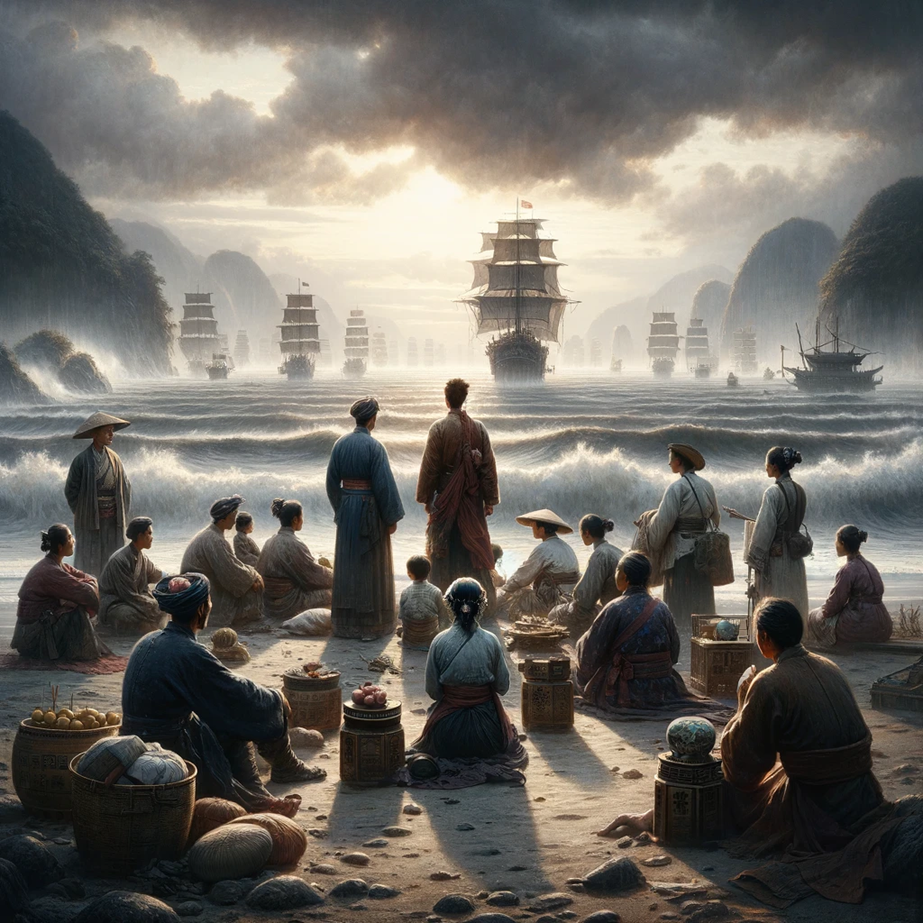Someone’s sitting in the shade today
because someone planted a tree a long time ago.―Warren Buffett
If you’ve been reading Quantum Wealth Report for any length of time, then you already know my family’s story.
It starts in pre-revolutionary China.
Back in the late 1800s, this was a fractured and turbulent nation:
- China was being fought over by different groups. Warlords. Communists. Nationalists.
- This meant that starvation, disease, and murder was the rule of the day.
Among the many who suffered during this awful time were my great-grandparents. They were of Fuzhou descent and lived in Fujian, a coastal province on China’s south-east:
- The violence was rising. The economy was nosediving. My great-grandparents had much to worry about.
- Fortunately, there was a glimmer of hope here. You see, Western traders had long used Fujian as a base to spread Christianity and secure business opportunities.
- The British, in particular, were ardent recruiters. They encouraged the local Chinese to emigrate to Southeast Asia to work in rubber plantations and tin mines.
- ‘A better life for you. A better life for your children.’

Source: Image generated by OpenAI’s DALL-E
This message of salvation was impossible to ignore. So my great-grandparents made the fateful decision:
- They took a chance and boarded one of the rickety boats that were packed with a heaving mass of humanity. Nervous but hopeful, they departed their homeland forever.
- The journey on the South China Sea was treacherous. Some boats capsized along the way. Other boats were intercepted by pirates. Stories of pillage and murder and rape were common.
- Thankfully, my great-grandparents were the lucky ones. They made it safely through. Eventually, they arrived on the rugged shores on what was then British Malaya.
My great-grandparents disembarked, staggering down the pier, the crushing flotsam of migrants streaming around them:
- There was no red-carpet welcome waiting. Just the harsh reality of being dirt-poor and trying to start a new life amidst the humid climate and tropical terrain.
- Still, my great-grandparents counted their blessings. The food in Malaya was reasonably abundant, and the British colonials were nowhere near as cruel as the Chinese warlords back in the old country.
- All things considered, Malaya felt like a land that was good enough for them to set down roots in. To catch their breath. To work towards a better future. Maybe.
But one thing was for sure. Even after moving countries, my great-grandparents never enjoyed an easy life. What they did, they did for survival:
- Here’s a sobering statistic: the global life expectancy in the year 1900 was 32. In itself, this is a shocking number. But get this: in Asia, the life expectancy at that time was lower still. It was only 28.
- This meant that anyone who lived to the age of 40 was considered a superman. You got to live a bit longer so you could work a bit longer. Indeed, in those days, you didn’t retire. You couldn’t afford to. You simply worked until you were broken or you died. Whichever came first.
- Yes, this was a raw deal. But it was the only deal available. So, my great-grandparents made the sacrifice so that their future descendants — maybe — could have a better life.
Now, as I look back at my family’s history, I feel a great sense of wonder and gratitude. My great-grandparents took a courageous step into the unknown. And I don’t think they could have dreamed of what happened next:
- You could call it a miracle. My family went from peasants to refugees; working class to middle class; all in the space of just four generations. Indeed, we progressed more in four generations than we did in the previous 10.
- Is this unique? Why, no. My family’s story is the story of how the 19th century transitioned into the 20th. This was a time of profound social change and economic transformation.
- It used to be that only royals and aristocrats could enjoy a relaxed life in old age. But in the post-World War II era, that was transformed as we entered a golden age of wealth and prosperity.
- The common people could now enjoy the fruits of retirement as well. Social-security programmes were rolled out on a grand scale. The availability of pensions became universally accepted. And best of all, the elderly were able to live longer and healthier lives.
Does this sound like a utopia? Yes, it’s as close as we’ve ever been to one. But watch out. We shouldn’t take retirement for granted. In the 21st century, the landscape are changing yet again. Here’s why the stakes have never been higher:
- Last week, in Part One of my investigative series into the reality of retirement, I talked about the rise and fall of our social-security system. It was good while it lasted, but we’re now facing the most dramatic demographic shift in decades. This means that our pensions are looking increasingly stretched. Increasingly exhausted.
- It’s clear to me that government-led programmes are no longer as effective as they used to be. This is putting the baby boomers in a tough position. Indeed, they will have no choice but to start futureproofing themselves financially.
- So now, in Part Two, I want to cover the urgent steps that savvy investors are already taking to remedy this. They are preparing for the next quantum wave. Their goal? To secure a happy and fulfilling retirement, as well as protect generational wealth. And they want to do it on their own terms…
Your first Quantum Wealth Report is waiting for you:
⚡🌎 Start Your Subscription: NZ$37.00 / monthly
⚡🌎 Start Your Subscription: US$24.00 / monthly







John is the Chief Investment Officer at Wealth Morning. His responsibilities include trading, client service, and compliance. He is an experienced investor and portfolio manager, trading both on his own account and assisting with high net-worth clients. In addition to contributing financial and geopolitical articles to this site, John is a bestselling author in his own right. His international thrillers have appeared on the USA Today and Amazon bestseller lists.